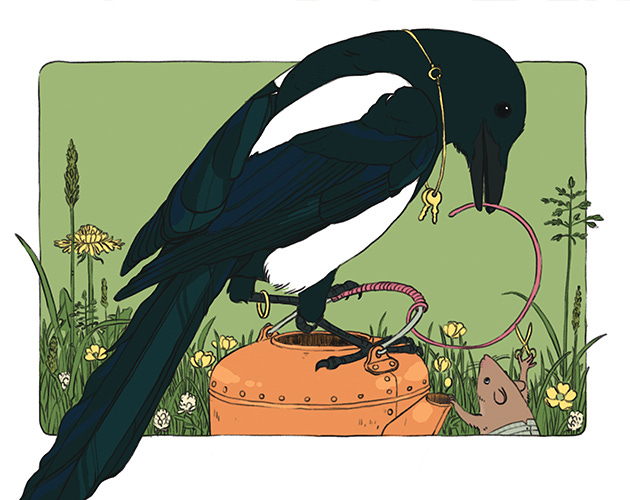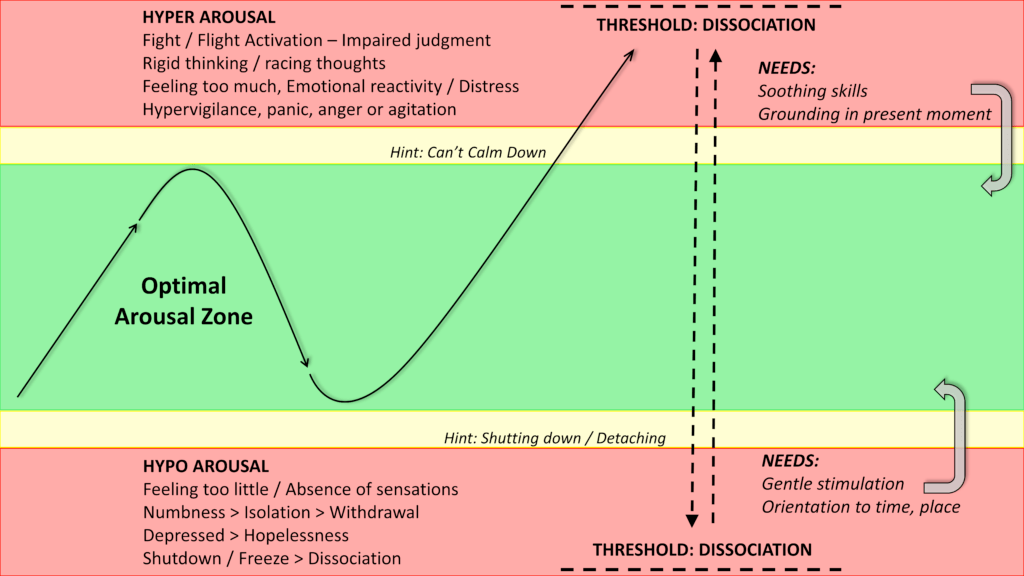Notes from the Inflection Point explores ways to process and express climate-related emotions like love and fear together. With a voice dedicated to seeing things afresh, again, and with agency, we offer readers reflections most Thursdays.
Can climate grief and imagination co-exist?
I recently played Roberto Bisceglie's We Were Here Once, a journaling prompt system about documenting a collapsing civilization. We Were Here Once invited me to explore the relationship between creation and destruction, loss and creating something new, at a pace and depth I wanted. I rolled dice to discover a place called Vashelek…
Vashelek’s decaying landscape looks like “a single, immense ruin—too large to have ever been real.”
Despite “the air is growing thinner, making each breath a struggle,” Vashelek’s last generation continued practicing a cultural “ritual involving fire, performed as a sign of hope.”
As the oxygen diminishes, its inhabitants’ final words will be “Will the sky remember our shadows?”
Creating this world, my character, and documenting those final days, I felt a mixture of anxiety, curiosity, excitement at how this story would unfold. The outcome was known, but I crafted what that meant.
This post explores why our brains struggle with climate emotions, how play can help us process them while building agency, and share specific tools you can try.
For most of us, making meaning of our current planetary predicament results in more dread than data. It’s hard for experts to articulate, and the vast majority of us to imagine the scope, scale, and speed of climate change in the first place. This makes engaging our climate emotions “afresh, again, and with agency”—as Lou and I aspire to do—feel like a big ask.
As an example, Lou invited us to remember the cold in “Inversion.” Balancing somatic memories, present moment awareness, and space for new possibilities can be challenging.
I don’t take this personally, and hope you don’t either. This is just how human brains work. Chronic stress reshapes our brains. The hippocampus plays a huge role in memory and imagination, and shrinks under prolonged exposure to the stress hormone cortisol.
The past few months have been pretty stressful for many. Our biological and ecological stress compounds on top of economic, political, and social uncertainty.
Another reason why it’s hard to picture actual adaptation and why change depends on imagination: we haven’t seen or heard of many communicated visions about adaptation that aren’t dystopic horror. We’ve consumed more media around ecological devastation, collapse, serial killers, and zombies than how societies implement sociocultural and economic change.
But with all this weight—shrinking attention, rising anxiety, dismantled environmental protections—how do we begin to create that vision?
And why bother, when things look this bleak, when more acute forces endanger our lives?
For me, the answer is material: we’re still here. (Thank you for reading.) That means we still have environmental impact and agency. We get to choose what that impact looks like and how we understand it.
Climate emotion work and research is a fairly new field, occupied by groups like the Climate Mental Health Network and spiritual programs like the Eco-Chaplaincy Training offered by the Sati Center. Folks like Andrew Bryant, founder of Climate & Mind in Seattle, have written clear and extensive overviews of climate grief and ways to stay present.
There are many ways to work with difficult emotions—exercise, healthy eating, formal meditation all have their place. But I want to share another tool: play.
“What does play look like for adults processing grief?” Well, let’s back up and into a definition.
To play: To actively create temporary spaces to explore alternative narratives, perspectives, and relationships.
Escapist play is a fun tool, but it’s not what I’m referencing here. Rather, I’m pointing to play as a tool to deliberately engage with difficult realities while providing enough psychological distance to prevent overwhelm. This is a matter of orientation, intention, and purpose.
"If I'm already anxious about keeping my job, my civil rights, freedom of speech, on top of climate change, why would I want to spend more time thinking about it?”
Play invites us to explore what we know and don’t know to process emotions through meaning-making. It is a practice of curiosity building and ultimately, one of patience and shared compassion.
Under supportive circumstances, play keeps one in the optimal arousal zone, providing both soothing skills and gentle stimulation, as depicted in the image below.
Play can take many forms—from movement to art to storytelling. My work over at Light Hive (and in my personal life) has been around live-action role-playing and tabletop role-playing games (TTRPGs). TTRPGs can sound intimidating if you've never played or solely associate them with Dungeons and Dragons.
I invite you to imagine them as imagination tools with plot twists.
Solo journalling games, like We Were Here Once, mean you don’t need to worry about learning tons of rules or finding a group.
As the name suggests, you play (journal) alone, for whatever amount of time you have, over however many sessions you’d like. Instead of staring at a blank page, you might be rolling dice or drawing cards to respond to specific scenarios, character choices, or world-building questions. Removing the live-action element of table-talk, these allow you to befriend your own mind in your own time.
In journalling games, this is the win state.
When I play these solo games, I give myself permission to really notice myself how I am relating to the prompts, my writing, and the effects the process is having on me. This embodied, intimate experience is part of what makes solo imagining so powerful.
“But it made you anxious. Why would I do that to myself?” At any point, you can re-roll, re-draw, revise, stop. This is what these games offer: a container for difficult feelings and a reminder we always have agency.
And if we have agency in our bodies, in our own time, we can have agency in other domains. You get to decide if your emotions hold you, or if you hold your emotions.
Where do we begin? Now. Here. I’ve added some relevant solo games for you to check out below.
And while we can play alone, we can also share what these games evoke for us together.

I’m hosting a journaling group in June. We’ll play Gene Koo’s The Bonsai Diary (see review here) over three 90-minute Monday sessions, each beginning with a short, lightly guided meditation. We’ll then develop narratives around our relationship to our growing trees. We will share with the group as we grow together. Come as you are, with the setting intended to be reflective, open, and kind.
Notes from the Inflection Point (NIP) readers can use code “Hive50” to participate for $15 but, if you’re interested and low on funds, please reach out for the link. If you want to be there, I want you there.
A few solo journalling games I see related to NIP themes:
Roberto Bisceglie, Seeds of Renewal (free)
Post-collapse re-building game
Anna Blackwell, Apawthecaria ($19)
Forage for and administer reagents needed to cure ailing animal friends
David Blandy, Lone Eons ($5)
Solarpunk “designed to help see our climate reality and high fantasy afresh”
Meghan Cross, Weeds in the Waste ($8)
Tend a garden in a post-apocalyptic wasteland
Logan Timmins, Sapling Soul ($7)
“You belong to the forest, but the forest does not belong to you.”
Do you know of others?
Bio
Logan Juliano, PhD (they/them) is a queer, transracial adoptee, and everyperson at Light Hive, a newsletter that shows how Buddhist frameworks and play can help navigate identity and the polycrisis. They hold a PhD in Performance Studies and today they are grateful for internet access, physical health, and the health of their two cats, Fischer and Portman.




Reading this was incredibly moving. Thank you for holding We Were Here Once with such care and clarity—it means a lot to see it living in someone else’s hands and imagination like this. The idea that play can be a container for grief, not an escape from it, resonates deeply with why I made the game. Vashelek’s story, as you’ve told it here, carries a quiet dignity and warmth even in its final moments. That balance between loss and agency, collapse and creation, is exactly the space I hope we can keep exploring—together, and in our own time. Thank you again for this thoughtful reflection.
Hi Logan, thanks for this reading list and of course thanks for lifting up The Bonsai Diary. There's another game that I would commend for encouraging players to "create new ideas, frameworks, or rituals from outdated, decaying old ones" -- that's "The Old Ways Must Go" by Mothspire Games -- I think it is very much in line with what you describe so thoughtfully. https://games.mothspire.com/the-old-ways-must-go/